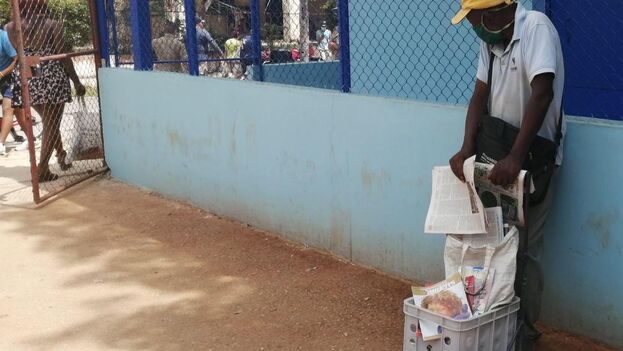
![]() 14ymedio, Havana, 27 March 2023 — The official press will begin to incorporate advertising in the midst of the economic crisis that Cuba is experiencing, Escambray reported on Monday, and it describes this new stage as an “experiment” in which 15 other state media will also participate. Although the newspaper insists that there will be a change in editorial management, it also says that the press will continue to be governed by the political model of the Revolution.
14ymedio, Havana, 27 March 2023 — The official press will begin to incorporate advertising in the midst of the economic crisis that Cuba is experiencing, Escambray reported on Monday, and it describes this new stage as an “experiment” in which 15 other state media will also participate. Although the newspaper insists that there will be a change in editorial management, it also says that the press will continue to be governed by the political model of the Revolution.
Escambray says that “sooner rather than later” the possibility of having advertising or including in its business portfolio the elaboration of campaigns and communication plans for legal companies and natural persons will materialize, although it does not specify what type of companies could advertise. Radio Sancti Spíritus will do the same and will have an air-conditioned room and a recording studio for “its potential customers.”
With this change, the “economic support” for the official press will be distributed from the income it receives from the state budget, from allocations for “special treatment” and as a communication company. Until now, the Government has maintained the discourse that advertising in newspapers, radios, television and any official media are practices of capitalist media and associated with the Cuban Republican past.
However, the newspaper wonders if the conditions are now in place for that change, since “the public media system, which worked in another context, is barely on crutches in the 21st century.”
Despite the fact that the media insists that the change “is a wide open window” and occurs in a context that cries out for a new model of management of the public press, it recognizes that the official media will remain aligned with “Cuban-style socialism,” around the “solid foundations and strong forces” of the Revolution.
The official press is part of the government machinery aimed at extolling the political and economic model, in addition to disseminating its slogans. From time to time, however, the regional media publish relentless reports on the deterioration of the economic and social activity in their territories. Pressured by social networks, the media have also had to deal with issues little addressed by the regime, such as the wave of violence suffered by Cuba and the migratory exodus.
Even so, Escambray considers that the press has been an “essential pillar” in state management, but that the new strategy will try to “remove from its letter and spirit” the “vertical, unidirectional and dusty paradigm of the mass media,” which “fulfilled its mission in another context.”
The article constantly defends the idea that the incorporation of advertising into its content “will enrich” its purposes but also states that this poses “ethical challenges,” such as defining how the media will deal “with a market for goods and services not explored by most Cuban media.”
The new “ideological paradigm” poses another challenge: to regain the credibility of the public media, in a context where the audience has grown for “informal communicative channels” associated with information technology, a clear allusion to social networks.
Nor does the newspaper miss an opportunity to blame the “permanent economic and media hostility of the United States,” which, in its opinion, conditions the press as a mechanism of political control.
Finally, Escambray recognizes that the much-acclaimed “modernization” also involves integrating into digital media, a space that is not taken advantage of “optimally” due to the lack of technological infrastructure and professional knowledge of the collaborators.
The change in the management of the state media is the prelude to the XI Congress of the Union of Journalists of Cuba, which will be held this coming July and where the progress of the model will be discussed. Escambray issues a warning that if these changes do not contribute to raising the “credibility of journalism and social authority… we will not even be halfway on the road to transforming the Cuban press.”
Translated by Regina Anavy
____________
COLLABORATE WITH OUR WORK: The 14ymedio team is committed to practicing serious journalism that reflects Cuba’s reality in all its depth. Thank you for joining us on this long journey. We invite you to continue supporting us by becoming a member of 14ymedio now. Together we can continue transforming journalism in Cuba.
